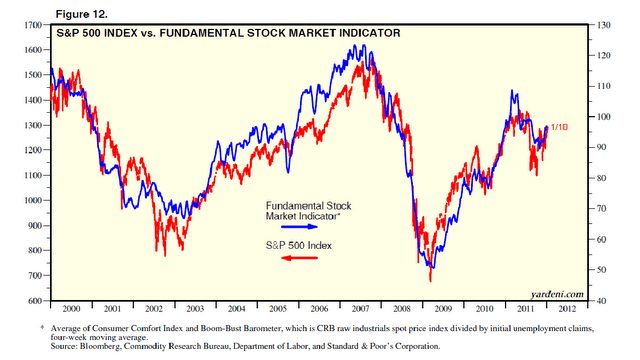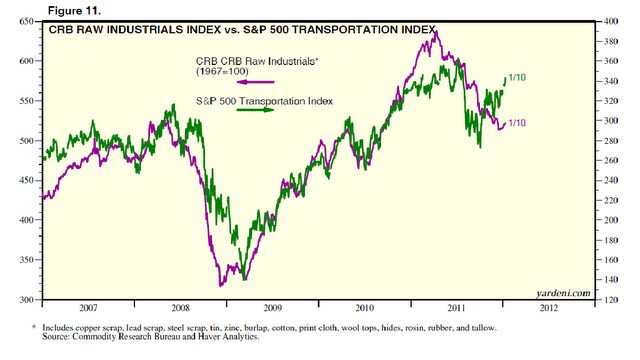Initial unemployment claims may be the most important economic indicator for the stock market  in 2012. It is one of the three components of our Fundamental Stock Market Indicator (FSMI), which is highly correlated with the S&P 500, [see graph below] so if initial unemployment claims remain under 400,000 and possibly continue to head lower during January, that would support the strong stock market rally that has kicked off the New Year so far. Words: 395 in 2012. It is one of the three components of our Fundamental Stock Market Indicator (FSMI), which is highly correlated with the S&P 500, [see graph below] so if initial unemployment claims remain under 400,000 and possibly continue to head lower during January, that would support the strong stock market rally that has kicked off the New Year so far. Words: 395
So says Ed Yardeni (http://blog.yardeni.com) in edited excerpts from his original article*.
Yardeni goes on to say, in part: The FSMI is still range-bound, but has moved higher during seven of the past nine weeks and is approaching its February 2011 cyclical peak. The recent rebound is attributable to the sharp drop in initial unemployment claims late last year…
*http://blog.yardeni.com/2012/01/fundamental-stock-market-indicator.html
Related Articles: 1. Don’t Invest in the Stock Market Without Reading This Article First History has shown that investors who stick to disciplined, fundamental-focused strategies give themselves a good chance of beating the market over the long haul and James O’Shaughnessy has compiled data that stretches back to before the Great Depression…back-tested numerous strategies, and has come to some very intriguing conclusions. [Let me share some of them with you.] Words: 1325 2. What Does 2012, as an Election Year, Mean for Stock Market Returns? Here Are the Facts Next year is a Presidential election year, and the stock market is almost always positive in election years. Right? At least that assurance has been a supposed truism for many decades, and repeated as fact each year in numerous interviews and financial columns. [Let’s explore just how correct those assumptions really are.] Words: 367 One of the hardest things for individual investors to do is to know when to sell a stock. Many times, you might sell simply because a stock has gone up and you’ve made some money. More often than not, though, this is not a great reason to sell [because, as mentioned in the title of this article,] you will never – ever – have a 10-bagger if you sell a stock after a 2-bagger. That being said, what things should one consider before selling? Words: 912 4. 10 Timeless Investment Rules to Survive This Stormy Stock Market Rules may be meant to be broken, but with investing ignoring the rules can break you – especially now. Investment rules are tailor-made for tough times, allowing you to stick to a plan just when you need it most. Indeed, a rulebook is important in any market climate, but it tends to get tossed when stocks are soaring. That’s why sage investors warn people not to confuse a bull market with brains. Here are 10 rules to survive this stormy stock market. Words: 769 |
 munKNEE.com Your Key to Making Money
munKNEE.com Your Key to Making Money


 FACEBOOK
FACEBOOK TWITTER
TWITTER


